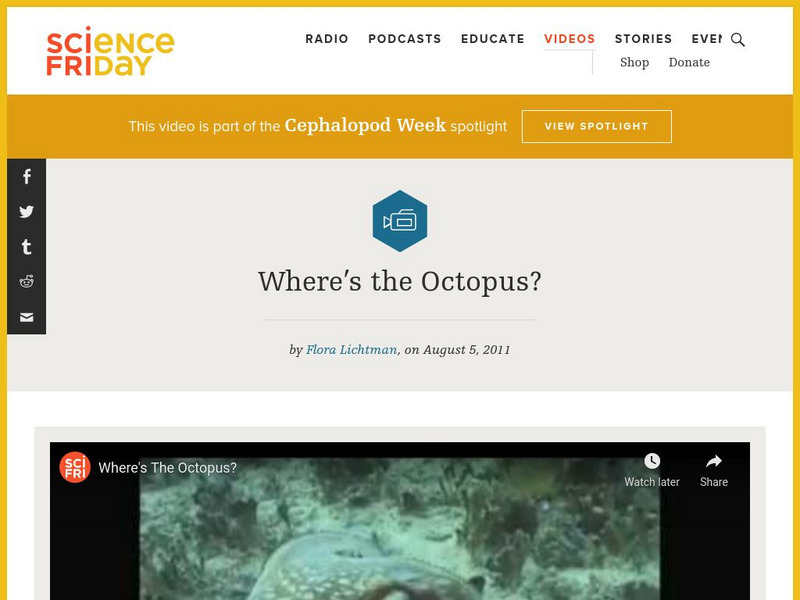PBS
Where Are All The Squid Fossils?
It might surprise you but cephalopods have a pretty good fossil record, with one major exception. If squids were swimming around in the same oceans as their closest cousins, where did all the squids go?
PBS
Nautiloids Thrived For 500 Million Years Until These Guys Showed Up
Around 30 million years ago, a new group of predators began to push nautiloids from their former global range into a single remaining refuge. But who were these predators?
PBS
The Evolution of the Heart (A Love Story)
In order to understand where hearts came from, we have to go back to the earliest common ancestor of everything that has a heart. It took hundreds of millions of years, and countless different iterations of the same basic structure to...
SciShow
Cephalopods Have a Totally Wild Way of Adapting
With their squishy bodies and color-changing abilities, octopuses and other cephalopods already look like our planet’s resident aliens. But researchers have discovered yet another thing that separates them from most other animals on...
SciShow
How Smart Are Animals, Really?
Measuring 'intellect' is a difficult task. Check out one way scientists are attempting to make this endeavor more testable. Hosted by: Hank Green
PBS
How the Squid Lost Its Shell
The ancestors of modern, squishy cephalopods like the octopus and the squid all had shells. In ancient times, their shell was their greatest asset but it eventually proved to be their biggest weakness.
SciShow
Cephalopods Have a Totally Wild Way of Adapting
With their squishy bodies and color-changing abilities, octopuses and other cephalopods already look like our planet’s resident aliens. But researchers have discovered yet another thing that separates them from most other animals on Earth!
SciShow
How to Find Thousands of Oceanic Fossils in... Ohio?
Modern-day Ohio is more than 600 kilometers from the ocean - yet it has thousands of ocean fossils dating back to the Ordovician, giving us a glimpse at its past under an ancient, fishless sea.
TED-Ed
TED-Ed: Why the octopus brain is so extraordinary - Claudio L. Guerra
ctopuses have the ability to solve puzzles, learn through observation, and even use tools - just like humans. But what makes octopus intelligence so amazing is that it comes from a biological structure completely different from ours....
TED Talks
TED: Underwater astonishments | David Gallo
David Gallo shows jaw-dropping footage of amazing sea creatures, including a color-shifting cuttlefish, a perfectly camouflaged octopus, and a Times Square's worth of neon light displays from fish who live in the blackest depths of the...
Be Smart
My Date With A Giant Pacific Octopus!
Joe went behind the scenes at Monterey Bay Aquarium to meet the Giant Pacific Octopus, a powerful and curious creature that challenges many of our notions of intelligence!
SciShow
Sparkling Clouds and Other Wild Ways Cephalopods Use Ink
Octopuses and other cephalopods can squirt ink when threatened, but the forms the ink takes can go way beyond your typical smokescreen.
SciShow
Colorfully Camouflaging Cuttlefish Are Colorblind
Colorfully Camouflaging Cuttlefish Are Colorblind
TED-Ed
TED-ED: How squids outsmart their predators - Carly Anne York
There are about 500 species of squid, and they live in all the world's oceans, making them a reliable food source for whales, dolphins, sharks, seabirds, fish - and even other squid. As a result, the squid's most extraordinary...
Curated Video
Southern Reef Squid
Visit the shallow spawning grounds of the colour-changing reef squid. Biology - Animal Kingdom - Learning Points. The southern reef squid is one of around 800 species of cephalopod. Cephalopods are the most intelligent of all...
Wonderscape
Unveiling the Octopus: Anatomy, Abilities, and Astonishments
This video delves into the fascinating world of octopuses, revealing their unique anatomy and remarkable abilities. From the structure of their bodies to their extraordinary features like blue blood, venomous beaks, and jet propulsion,...
Professor Dave Explains
Phylum Mollusca Part 4: Class Cephalopoda (Squids, Nautiluses, Cuttlefish, and Octopuses)
We now arrive at the most famous of the mollusks, the cephalopods. These include squids, nautiluses, cuttlefish, and the fascinating octopuses. These creatures are the largest and most intelligent invertebrates on Earth. Let's learn all...
Professor Dave Explains
Phylum Mollusca Part 1: General Introduction
We've covered most of Spiralia, but now it's time to dive into the final subclade, Lophotrochozoa. This contains several phyla, the most diverse of which is Mollusca. This phylum includes snails, slugs, octopuses, squids, oysters,...
Curated Video
Octopuses: Adaptations, Behavior, and Reproduction
This video provides a comprehensive overview of octopuses, also known as octopods. It discusses their characteristics, adaptability, and intelligence. It also touches on their solitary nature, mating behaviors, and reproductive process....
Science Friday Initiative
Science Friday: Where's the Octopus
A movie following the research of Roger Hanlon on cephalopods and their ability to use camouflage. Learn about a cephalopods ability not only to change their coloring but also their skin texture. Roger Hanlon explains his research and...
Science Friday Initiative
Science Friday: Squid, Octopus, Cuttlefish: Masters of Camouflage
In less than a second, cephalopods can change the color, pattern and shape of their skin.
Science Friday Initiative
Science Friday: Seeing a Cephalopod in Ancient Bones
Could a stash of ancient bones be the work of a giant cephalopod?



